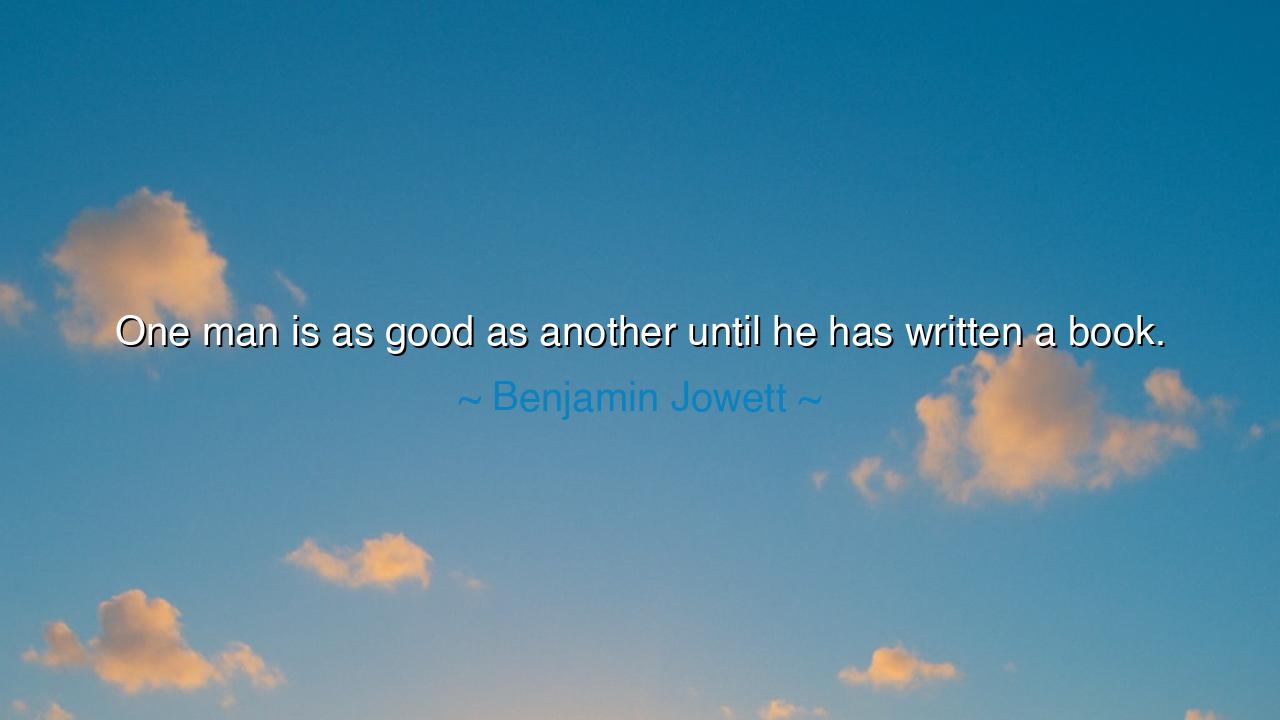
One man is as good as another until he has written a book.






In the great flow of history, where the deeds of men and the words of thinkers shape the world, there are moments when a single sentence cuts through the noise of time with the precision of a sharp blade. Benjamin Jowett, a man whose name echoes through the halls of philosophy and literature, once remarked, "One man is as good as another until he has written a book." This statement, at first glance, may seem a simple observation on the value of writing, yet within it lies a deep truth about the nature of humanity, reputation, and the way in which our actions can be transformed by the power of words.
To understand the weight of Jowett’s words, one must reflect on the ancient idea that the written word holds an almost divine power. The Greeks, with their great philosophers and poets, understood that the act of putting one’s thoughts to paper could change the world. Plato, for example, preserved the teachings of Socrates, not in the spoken dialogues of the master, but in his own written works. Through these words, the wisdom of Socrates transcended time, traveling far beyond the city of Athens to influence generations long after the philosopher’s death. In this way, writing became not just an act of expression, but a gateway to immortality—the chance to leave behind something that could endure far beyond the ephemeral nature of life.
This power of written words is not lost on Jowett, who reflects on how a man’s status and worth are often seen in a new light once he has written. In the ancient world, those who could inscribe their thoughts onto papyrus or parchment were seen as more than mere men. The Romans, for example, revered Cicero, whose writings on rhetoric and philosophy shaped the very foundation of Roman law and governance. Cicero, though an esteemed politician, was immortalized in the minds of generations because of the power and persuasion embedded in his writings. The act of writing elevated him from a mere man of the Senate to one whose influence stretched across the centuries.
But as Jowett’s words suggest, there is a subtle truth here: writing is a transformative act, one that elevates a man beyond the ordinary. To write a book is to present oneself to the world, to distill one's thoughts and ideas into something that can be passed down, that can inspire, or even transform others. It is not just the words on the page that matter, but the legacy of those words—how they are remembered, how they influence others, and how they become part of the eternal conversation of humanity. The written word gives permanence to what would otherwise be fleeting.
In the modern world, the importance of writing remains just as potent. The authors of history, whether in science, literature, or philosophy, have shaped the way we see the world. Darwin’s On the Origin of Species forever altered our understanding of life on Earth, while Shakespeare’s plays continue to resonate with the human condition. These writers, though mere men in their time, became immortal because of their ability to capture the complexities of the human experience in words. Jowett’s assertion reminds us that to write is to claim power—the power to shape thought, to alter perceptions, and to leave a mark on the world that will endure long after the writer’s death.
And yet, the lesson from Jowett's quote is not simply one of achievement through writing, but a deeper reflection on the human desire for recognition. Writing a book does indeed elevate a man, but it is the quality of the ideas, the honesty of the expression, and the clarity of the thoughts that matter most. The man who writes simply for glory or for the sake of fame misses the true purpose of this endeavor. The ancients understood that true greatness was not in seeking glory, but in contributing to the greater good—in offering something of value to the world. The great writers of history—whether Homer, Confucius, or Newton—wrote not merely to make their names immortal, but to illuminate the minds of those who came after them.
Thus, the lesson we take from Jowett's words is to recognize that while the act of writing can elevate us in the eyes of the world, it is the purpose behind that writing that determines its value. The words we leave behind, whether in the form of a book, a letter, or a simple note, have the power to transform not just our own lives, but the lives of those who come after us. Let us, then, write with intention, integrity, and a desire to contribute to the greater conversation of humanity. Whether we write for truth, beauty, or the expression of ideas, we must remember that our words, once written, hold the potential for immortality—not because of the fame they bring, but because of the truth and wisdom they carry forward.






AAdministratorAdministrator
Welcome, honored guests. Please leave a comment, we will respond soon